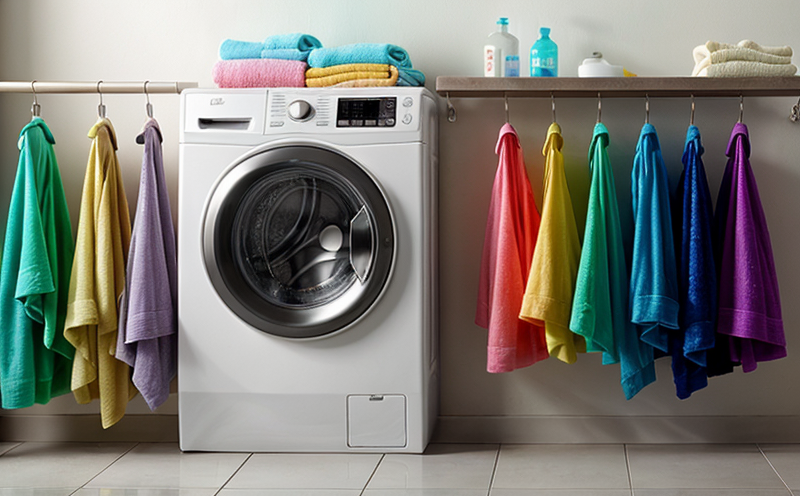JIS L0844 Colour fastness to washing evaluation
The JIS L0844 standard is an integral part of Japan's stringent quality control measures, specifically designed for the textile industry. This service evaluates how well a fabric maintains its color after being subjected to simulated washing conditions. The primary purpose is to ensure that clothing and other textiles remain visually appealing and do not fade or lose their color integrity over time.
Understanding the nuances of colorfastness is crucial for manufacturers, especially those operating in export markets where consumer expectations are high. JIS L0844 provides a standardized approach that helps textile companies meet these demands by ensuring consistent quality across batches and production runs.
The standard stipulates various washing procedures to simulate real-world use cases, such as home laundering with different detergents and water temperatures. This ensures that the colorfastness evaluation reflects actual consumer behavior rather than idealized laboratory conditions. The test parameters include the type of detergent used, the temperature at which washing is conducted (typically 30°C or 60°C), and the duration of each cycle.
Specimen preparation plays a critical role in obtaining accurate results. Samples are typically cut into standard sizes that can be processed uniformly through the washing machine. The standard also requires the use of specific detergents, which may vary based on the type of fabric being tested and the expected environmental conditions under which it will be used.
The evaluation process involves both visual inspection and instrumental color measurement using spectrophotometers. Visual inspection allows for qualitative assessment of color changes, while instrumental methods provide quantitative data that can be compared against set thresholds. The acceptance criteria are defined in terms of allowable color change units (ΔE) or specific color difference values.
For weavers and manufacturers, this service is essential for quality assurance and product development. By adhering to JIS L0844 standards, they can ensure that their products meet international expectations and avoid costly recalls or returns due to color fading issues. Additionally, this compliance can enhance brand reputation and customer satisfaction.
The JIS L0844 standard is particularly relevant for textiles intended for use in sectors where longevity and appearance are paramount, such as workwear, casual wear, and home textiles. It ensures that these products not only look good initially but also retain their aesthetic appeal over extended periods of use.
| Use Case Scenario | Expected Outcomes |
|---|---|
| A customer orders 10,000 units of workwear that will be subjected to heavy industrial washing. | The colorfastness test ensures the fabric retains its original color after extensive use and washing cycles. |
| Textile manufacturers wish to ensure their new fabric line meets international export standards before launch. | Data from JIS L0844 testing provides confidence in product quality, facilitating smoother market entry and sales negotiations. |
| A fashion brand seeks to develop a new range of casual wear that is both stylish and durable. | The test results help the brand refine its design choices, ensuring durability without compromising on style or comfort. |
| Procurement teams need to vet suppliers for colorfastness compliance before placing large orders. | JIS L0844 testing offers a reliable method to assess supplier reliability and ensure consistent quality across batches. |
Eurolab Advantages
At Eurolab, we pride ourselves on delivering comprehensive testing solutions tailored to the specific needs of our clients. Our expertise in JIS L0844 colorfastness evaluation ensures that your textile products meet the highest quality standards.
- Comprehensive Knowledge: Our team is well-versed in all aspects of JIS L0844, providing detailed insights into both the testing procedures and their implications for product development.
- State-of-the-Art Facilities: Equipped with advanced instrumentation like spectrophotometers, our labs ensure precise and reliable results. This precision is crucial in meeting the stringent criteria set by JIS L0844.
- Experienced Technicians: Our staff has extensive experience in textile testing, allowing us to provide accurate interpretations of test outcomes and actionable recommendations for improvement.
- Comprehensive Reporting: We offer detailed reports that not only summarize the results but also provide context and suggestions for future improvements. This holistic approach ensures that our clients have all the information they need to make informed decisions.
By leveraging Eurolab's expertise, you can ensure that your textile products meet JIS L0844 standards with confidence. Our commitment to quality and precision is unmatched, providing you with reliable data for product development and marketing strategies.
Environmental and Sustainability Contributions
Evaluation of colorfastness through JIS L0844 not only ensures the aesthetic integrity of textiles but also contributes positively to environmental sustainability. By preventing premature color fading, these tests help reduce textile waste, which is a significant contributor to landfills.
Manufacturers who adhere to JIS L0844 standards can extend the lifecycle of their products, thereby minimizing resource consumption and energy use associated with producing new garments. This aligns perfectly with global sustainability goals, as highlighted in the United Nations' Sustainable Development Goals (SDGs).
The standard's focus on durability also promotes responsible consumer behavior by encouraging longer-term use of textiles. This shift towards sustainable practices is becoming increasingly important as consumers and businesses alike become more environmentally conscious.
Moreover, JIS L0844 testing supports the development of eco-friendly textile innovations. By identifying and addressing colorfastness issues early in the production process, manufacturers can incorporate greener technologies that reduce environmental impact without compromising product quality.





